
Cloture, closure or, informally, a guillotine, is a motion or process in parliamentary procedure aimed at bringing debate to a quick end. The cloture procedure originated in the French National Assembly, from which the name is taken. Clôture is French for "the act of terminating something". It was introduced into the Parliament of the United Kingdom by William Ewart Gladstone to overcome the obstructionism of the Irish Parliamentary Party and was made permanent in 1887. It was subsequently adopted by the United States Senate and other legislatures. The name cloture remains in the United States; in Commonwealth countries it is usually closure or, informally, guillotine; in the United Kingdom closure and guillotine are distinct motions.

The Legislative Council of the Hong Kong Special Administrative Region (LegCo) is the unicameral legislature of Hong Kong. It sits under China's "one country, two systems" constitutional arrangement, and is the power centre of Hong Kong's hybrid representative democracy, though popular representation in the legislature has diminished significantly in recent years, along with its political diversity.

The Legislative Council is the upper chamber of Tynwald, the legislature of the Isle of Man. The abbreviation "LegCo" is often used.

The speaker of a deliberative assembly, especially a legislative body, is its presiding officer, or the chair. The title was first used in 1377 in England.

In New Zealand, the speaker of the House of Representatives, commonly known as the speaker of the House, is the presiding officer and highest authority of the New Zealand House of Representatives. The individual who holds the position is elected by members of the House from among their number in the first session after each general election. They hold one of the highest-ranking offices in New Zealand. The current Speaker is Adrian Rurawhe who was elected on 24 August 2022.

The Election Committee is a Hong Kong electoral college, the function of which is to select the Chief Executive (CE) and, since 2021, to elect 40 of the 90 members of the Legislative Council. Established by Annex I of the Basic Law of Hong Kong which states that "the Chief Executive shall be elected by a broadly representative Election Committee in accordance with this Law and appointed by the Central People's Government ." It is formed and performs its selection function once every five years, even in the event of a CE not completing their term. The membership of the Election Committee was expanded to 1,500 under the massive overhaul of the electoral system in 2021. The Election Committee has been criticised for its "small-circle" electoral basis and its composition favouring pro-Beijing and business interests.
Article 69 of Hong Kong Basic Law is an article in the Basic Law of Hong Kong. The article sets the term of the Legislative Council of Hong Kong (LegCo).
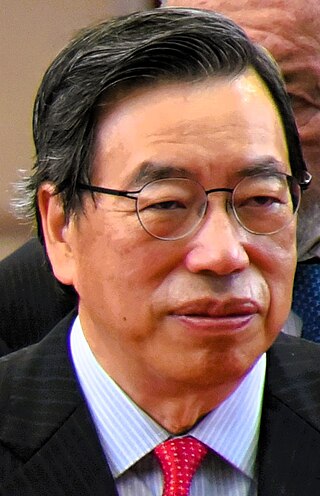
The president of the Legislative Council is the presiding officer of the Legislative Council of Hong Kong. According to the Article 71 of the Hong Kong Basic Law, the president of the Legislative Council is elected by and from among Legislative Council members, plays the presiding role, administrative role and ceremonial role, and ensures the smooth conduct of the Legislative Council meetings.
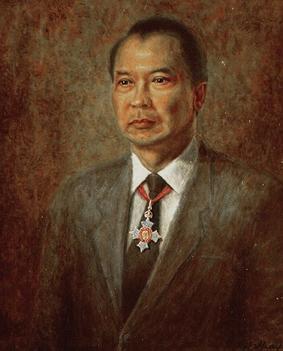
Sir John Joseph Swaine, was the President of the Legislative Council of Hong Kong from 1993 to 1995. A barrister by training, Swaine was an appointed and unofficial member of the council. Before 1993, the President was the Governor of Hong Kong.
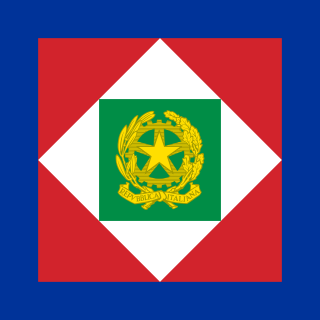
The president of Italy, officially titled President of the Italian Republic, is the head of state of Italy. In that role, the president represents national unity, and guarantees that Italian politics comply with the Constitution. The president is the commander-in-chief of the Italian Armed Forces and chairs the High Council of the Judiciary. A president's term of office lasts for seven years. The incumbent president is former constitutional judge Sergio Mattarella, who was elected on 31 January 2015, and re-elected on 29 January 2022.
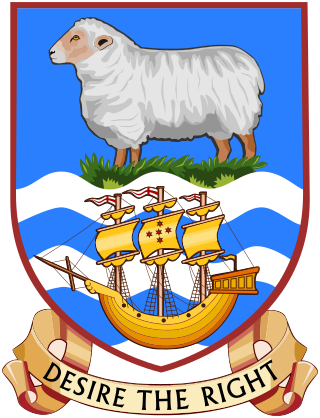
The Legislative Assembly of the Falkland Islands is the unicameral legislature of the British Overseas Territory of the Falkland Islands. The Legislative Assembly replaced the Legislative Council when the new Constitution of the Falklands came into force in 2009 and laid out the composition, powers and procedures of the islands' legislature.
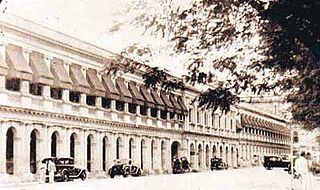
The Senate was the upper chamber of the parliament of Ceylon established in 1947 by the Soulbury Commission. The Senate was appointed and indirectly elected rather than directly elected. It was housed in the old Legislative Council building in Colombo Fort and met for the first time on 12 November 1947. The Senate was abolished on 2 October 1971 by the eighth amendment to the Soulbury Constitution, prior to the adoption of the new Republican Constitution of Sri Lanka on 22 May 1972. In 2010 there were proposals to reintroduce the Senate.
The President of the New South Wales Legislative Council is the presiding officer of the upper house of the Parliament of New South Wales, the Legislative Council. The presiding officer of the lower house is the speaker of the Legislative Assembly. The role of President has generally been a partisan office, filled by the governing party of the time. As of May 2023, the president is Ben Franklin.

A plebiscite on whether the Sanitary Board should have an official or unofficial majority was held in Hong Kong in June 1896. It was the only plebiscite conducted by the Hong Kong Government on record. The other de facto referendum launched by the pro-democracy camp through the by-election in 2010 was not officially recognised.

The 1994 Hong Kong electoral reform was a set of significant constitutional changes in the last years of British colonial rule in Hong Kong before the handover of its sovereignty to the People's Republic of China (PRC) on 1 July 1997. The reform aimed at broadening the electorate base of the three-tiers elections in 1994 and 1995, namely the 1994 District Board elections, the 1995 Urban and Regional Council elections and the 1995 Legislative Council election. It was the flagship policy of the last colonial governor Chris Patten.
The election for the President of the Sixth Legislative Council took place on 12 October 2016 for members of the 6th Legislative Council of Hong Kong to among themselves elect the President of the Legislative Council of Hong Kong for the duration of the Council.
The 1998 Financial Services by-election was originally scheduled on 5 November 1998 after impeachment of the incumbent Legislative Councillor Chim Pui-chung for conspiring to forge documents. Fung Chi-kin from the Hong Kong Progressive Alliance and was declared elected on 16 October after uncontested, retaining the seat for the pro-Beijing camp. This was the first legislative by-election after the handover of Hong Kong.
The 1998 Regional Council by-election was held on 29 October 1998 after the court ruled the incumbent Legislative Councillor Tang Siu-tong was unduly elected in the Regional Council constituency due to invalid ballots. Tang eventually recaptured his seat with a larger margin in this by-election.
The election for the President of the Second Legislative Council took place on 4 October 2000 for members of the 2nd Legislative Council of Hong Kong to among themselves elect the President of the Legislative Council of Hong Kong for the duration of the council. Rita Fan from the pro-Beijing camp defeated former President Andrew Wong and was re-elected.













